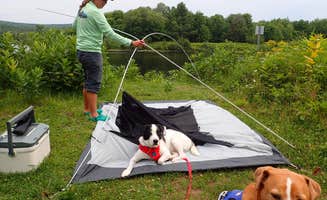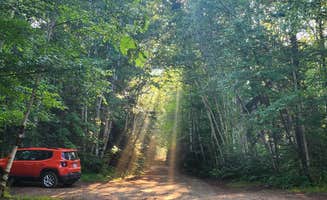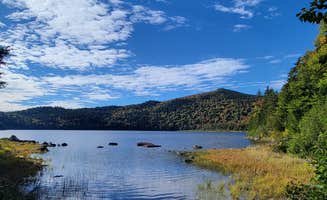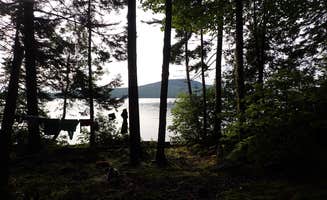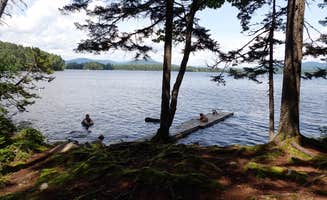Dispersed camping near Caratunk, Maine offers outdoor enthusiasts remote lakeside and riverside sites throughout the North Maine Woods region. Most primitive campsites sit at elevations between 1,000-1,500 feet, with late spring through early fall providing the most accessible camping conditions. Winter camping requires specialized equipment and experience due to average January temperatures around 10°F and potential snowfall exceeding 70 inches annually.
What to do
Paddle the Moose Bow Loop: Access primitive sites like Mosquito Rips where paddlers can enjoy rapids depending on water levels. "Depending on the water level and your skill, you can paddle the rapid or line your boat. We chose to line given we were traveling with our dogs," notes Sarah C.
Hike the Forest Legacy Trail: The trail provides access to several remote campsites including Smudge Cove. "You can also backpack in and enjoy some pretty cool Maine forests along the way. There is also relatively easy access to the water by way of the rocks, beside the dock," according to a reviewer.
Wildlife photography: Dawn and dusk offer prime moose-viewing opportunities at several locations. Bring binoculars and telephoto lenses for optimal viewing from a safe distance. "We had kayaks. We stayed here, just to be up early enough to paddle out and wait for moose to show up," shares one visitor.
What campers like
Mountain views: Several sites offer panoramic vistas of surrounding peaks. "Great spot if you don't mind dry camping. Amazing views of the surrounding mountains," writes Thomas B. about Upper Gravel Pit.
Riverside camping: Sites along waterways provide natural sound barriers between campsites. "We drove there looking for privacy with our dogs to camp overnight. There are about 4 total spots, but only 1 of the four is truly enjoyable/private," notes one camper about Trout Brook Campground.
Secluded paddling sites: Boat-in locations offer more privacy than drive-in sites. "This is a small impacted spot along the Dead River along the Northern Forest Canoe Trail (NFCT). The site is not easily visible from the river and there is a steep bank you have to navigate to unload and pull your canoe or kayak up for the evening," describes Sarah C.
What you should know
Fire permit requirements: Obtain permits before camping if planning campfires. "You need a fire permit in order to have a fire. You can obtain a permit at the Fire Department in the town of Jackman," advises one reviewer.
Site conditions vary significantly: Many sites lack basic amenities and terrain can be challenging. "This site, while in a beautiful spot perched above Cupsuptic Lake, is so impacted that in the rain it was a literal mud pit," warns a camper about Raven.
Access road limitations: Most dispersed sites require traveling unpaved roads. "The access road in is rough, not for normal street cars," notes one camper. Another adds, "The road to the pit is gravel and bumpy but you don't need a 4-wheel drive or high clearance vehicle."
Tips for camping with families
Consider site privacy: Some locations offer minimal separation between sites. "This area is overused, and it shows, sites are worn in and if there was room relocating fire pits and allowing some nature to come back would be nice," mentions Miccal M.
Look for established facilities: Some primitive sites offer minimal infrastructure beneficial for family camping. "There are three free campsites off Route 16 between Rangeley and Stratton, ME, located on the Dead River. Head northeast out of Rangeley toward Stratton," notes one camper about Rangeley-Stratton Road Camp.
Plan for wildlife viewing: Schedule activities around prime wildlife hours for memorable experiences. "In the two nights we stayed here, we saw 5 moose. Likely the same 2-3 but hard to tell. We saw them at dusk and dawn," shares one enthusiastic wildlife watcher.
Tips from RVers
Size restrictions: Most dispersed sites accommodate smaller rigs only. "Not larger RV friendly but was comfortable enough to get the 27' foot trailer in," reports Chris T.
Parking considerations: Some sites have steep or narrow access points. "The short road up to the camping area is quite steep with somewhat loose rocks," warns Nancy W. about Lazy Tom Bog.
Waste management: No dump stations at primitive sites. "There are no utilities, potable water, restroom, or garbage facilities so bring the water you need and carry out your trash. (There is a dump station at the nearby Moosehead Family Campground)," advises one RVer.



